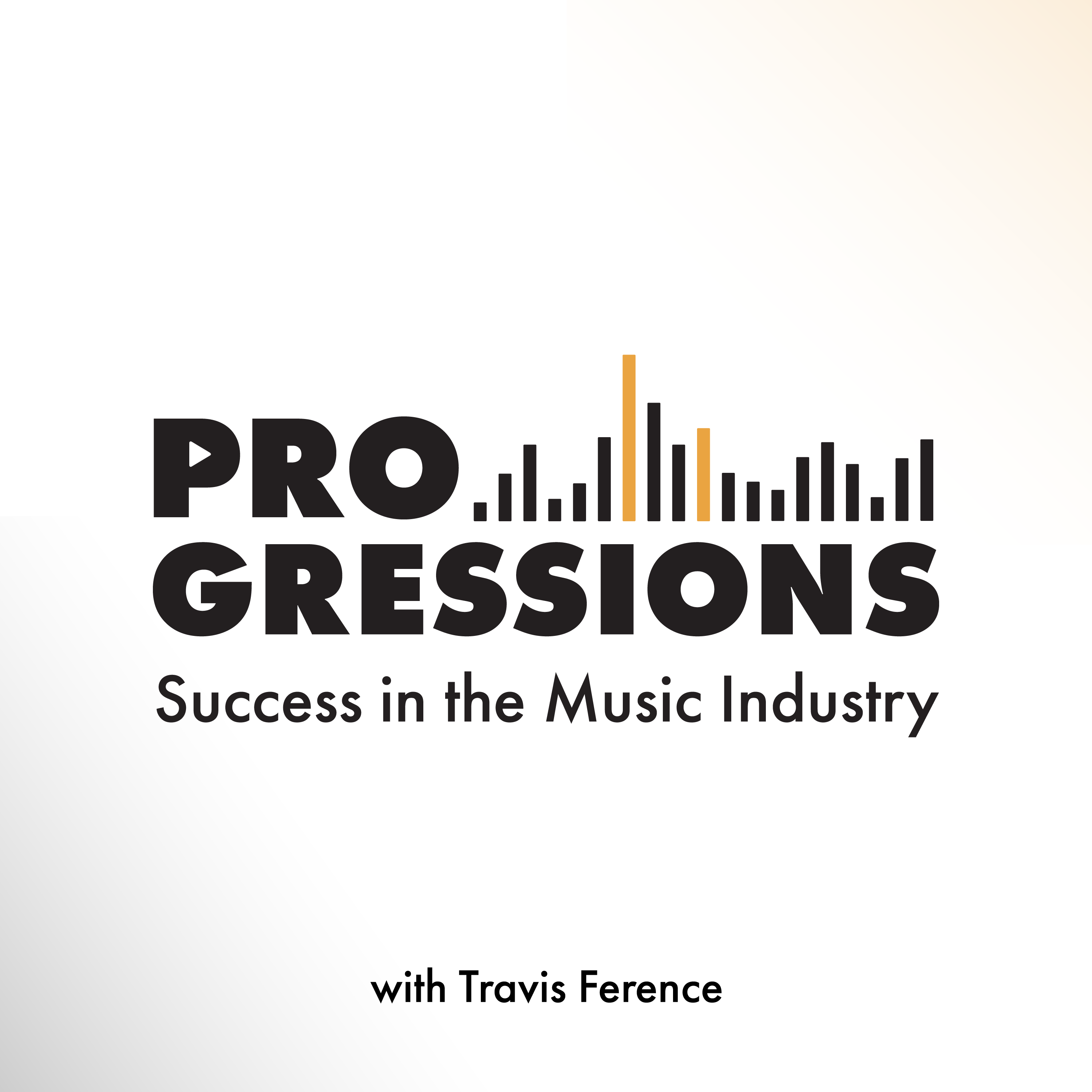How to Set Your Rate: Defining Your Value as a Music Freelancer
Knowing what to charge is one of the hardest parts of working as a freelancer. In this episode Travis discusses how tracking his time for the last five years has helped him confidently define his rates and shares tips for how you can best determine what to charge for your services as a music production professional.
In this episode, you'll learn about:
- How to determine your average hourly wage
- Why you need to understand your expenses
- How to make more money without directly raising your rate
⬇️ FREE 2025 PLANNING WORKSHOP ⬇️
https://www.travisference.com/2025plan
📺 WATCH THE SHOW ON YOUTUBE 📺
https://www.youtube.com/@progressionspod
Connect with Me:
📬 Newsletter: https://www.travisference.com/subscribe
📸 Instagram: https://www.instagram.com/progressionspod
🎵TikTok: https://tiktok.com/@progressionspod
🐦 Twitter: https://twitter.com/progressionspod
🌐 Website: https://www.travisference.com/
🙏 Leave a Review or Rating 🙏
Apple: https://www.progressionspodcast.com/apple
Spotify: https://www.progressionspodcast.com/spotify
📢 Our Sponsors 📢
Listen to Secret Sonics!
Sign Up for Complete Producer Network!
Credits:
Guest: N/A
Host: Travis Ference
Editor: Travis Ference
Theme Music: inter.ference
Transcript
Am I charging enough? Can I charge more? And what do they charge?
Speaker:These are the questions that keep music freelancers like you and I up at night.
Speaker:Last year I more than doubled my income from engineering and mixing, and I want
Speaker:to help you do the same by giving you a set of tools to help
Speaker:you understand how to value your time. This episode is not about getting more
Speaker:clients. It's about being confident about the value of your time and
Speaker:translating that to your rates. So if you're new to the show, my name is
Speaker:Travis Ference. I've been working as a recording engineer and mixer in Los Angeles for
Speaker:almost 20 years. I bounce back and forth between being on staff
Speaker:at studios and freelancing, and for the last seven years I've been fully
Speaker:freelance. And it's only been like the last half of that time that I've
Speaker:really felt that I understood rates and value. So let's get right into
Speaker:the question that we are all asking ourselves. What should my
Speaker:rate be now? I should warn you that I'm not going to give you a
Speaker:specific one rate fits all answer here. It's going to be different for everybody
Speaker:and it's going to change throughout your life. And that's the key point. Your rate
Speaker:has to change. What I'm going to do is I'm going to give you philosophies
Speaker:and ideas that have helped me answer these questions for myself. The first
Speaker:step to determining your rate is to understand the current value of your time.
Speaker:Not what you believe your time should be worth, but what you're actually making per
Speaker:hour of time worked at this moment. About ten years ago, I was on
Speaker:staff as an engineer at Capital Studios in Hollywood. I was making around
Speaker:$35 an hour, which felt substantial compared to the $10 I started at
Speaker:when I first moved to LA. But the real money was in the freelance mixing
Speaker:I was doing on the side. Or at least so I thought I was doing
Speaker:mixes for at best, $500 a song. $500. That
Speaker:was a lot of money at the time. An eight hour day at Capital was
Speaker:only getting me 280 before I paid the tax man, so this was
Speaker:way better, right? I assumed it was until I
Speaker:counted the hours that it was taking me to deliver a mix. That's when I
Speaker:realized that I was actually making more per hour at my engineering gig. I had
Speaker:fallen for the illusion that many of us are tricked by the illusion that a
Speaker:project fee is making us more money than working an hourly job.
Speaker:But many of us don't take into account the amount of time it takes to
Speaker:do that job, we just get excited about putting a bigger number at the bottom
Speaker:of the invoice. I was pretty shocked when I did the math and learned my
Speaker:hourly gig was paying me more. So I started tracking every project I
Speaker:did that wasn't through capital. Everything from engineering day rate gigs
Speaker:to mixed projects. It all went into a spreadsheet. There's a version of
Speaker:that spreadsheet available for free in the description below. Download it if you want to
Speaker:check it out and get nerdy and so by doing this, I was able to
Speaker:start understanding what kind of jobs took how long, and then in
Speaker:turn how to create project quotes that would fit the artist budgets and still pay
Speaker:me a reasonable wage. This might seem a little overkill, but I found that
Speaker:knowing what your average hourly rate is helps you understand if you're actually making more
Speaker:money as a freelancer. We all have ups and downs, right? Maybe you made
Speaker:$50,000 from music one year and 60,000 the next year. That's
Speaker:an increase year over year, right? Well, what if that
Speaker:$60,000 year was actually made up of more projects that were lower
Speaker:paying gigs than the year prior? If that's the case, then it's likely that your
Speaker:hourly that year would have actually gone down, so you technically
Speaker:made less money for your time. This is why I think as a freelancer, your
Speaker:hourly wage better dictates how much you're making than a yearly gross
Speaker:total does. Another reason to be aware of your current hourly is to make sure
Speaker:you're even making a livable wage. If you're making, say, $20 an hour
Speaker:working at a local restaurant and you're only making $8 an hour from your music
Speaker:side work, then you should not be rushing to quit that job just
Speaker:yet. Wait until you see that you're making at least the same. Then you know
Speaker:that you'll be covering your expenses and maintaining your standard of living.
Speaker:Which brings us to our next point. You've got to understand how much
Speaker:money you need to live. So now that you know how much money you're making
Speaker:from your music, the next step to determining your ideal rate is to understand
Speaker:your expenses. Begin by listing out your core living expenses.
Speaker:What is your rent? How much do you spend on food and transportation? What are
Speaker:your monthly business expenses? Do you have subscriptions or studio rentals? And
Speaker:don't forget about debt, loans, mortgage, car payments, all of that.
Speaker:List it all out. With that in mind, you can use the
Speaker:knowledge of your average hourly rate, along with how long it usually takes you to
Speaker:do a job to see how many jobs you need to do to pay those
Speaker:bills every month. Is it a realistic number? Do you need to do four gigs
Speaker:a month or 100 gigs a month? And how does that number stack up against
Speaker:the number of gigs you're currently doing? I'm not going to work through every
Speaker:scenario here because everybody watching this is going to be in a completely different
Speaker:financial equation. But just try different numbers in your equation, try
Speaker:different rates and see how things fit together. And again, you can do this on
Speaker:the downloadable worksheet that is linked in the description. But before we move on, I
Speaker:have to say, do not, please do not forget about the
Speaker:future. If you're trying to make music your full time job, then yes,
Speaker:worry about matching your income first. But if you're watching this and you
Speaker:already make most of your income from music production, then start
Speaker:thinking about saving. How much do you need to set yourself up for
Speaker:retirement or having a family or going on vacation? Now, I'm not the one to
Speaker:be giving proper financial advice, but I can say from 20 years in
Speaker:this business that many of the music production jobs that you're going to find out
Speaker:there only pay you when you're in the room doing the work. So will
Speaker:you want to be in the room doing the work at 70? Maybe? Hopefully,
Speaker:right? Because we all love this, but maybe not. You've got to
Speaker:think long term. Once you have the financial positioning to do so. And so
Speaker:along those lines, don't forget to give yourself a raise. Like I mentioned
Speaker:in the beginning, that's the best part of being a freelancer. You have the power
Speaker:to increase your rate at any time you choose, especially in the current world of
Speaker:high inflation. If you see the earning power of your dollar going down, then you
Speaker:have got to compensate in your business. And that brings us to the last
Speaker:part of this episode, how to raise your rates. And if you figured
Speaker:anything out from this episode so far, then you know I'm not going to give
Speaker:you a direct answer on this. I'm just going to give you a set of
Speaker:things to get you thinking. So first off, if you want to raise your rate,
Speaker:what's stopping you from just raising it? Why isn't the
Speaker:next quote you send someone double what the last one was? You just
Speaker:hopefully spent time understanding your hourly wage and your required
Speaker:expenses. You've got a number to look at, so look at it. Is that
Speaker:hourly wage what you believe your time is worth? It's that
Speaker:simple. When you see that number, are you pissed or are you feeling
Speaker:pretty good? If you're not satisfied, then what makes you feel
Speaker:compensated for your time? If you're making $10 an hour and you want
Speaker:20, why can't you double your rate? Ultimately, your worth comes down
Speaker:to what you want it to be. If you're letting others determine your worth,
Speaker:then you'll never have the control you want. An example of letting other people control
Speaker:your worth is taking every job for any amount. If you're starting
Speaker:conversations with what's your budget? Then you're essentially
Speaker:saying, I don't know what I'm worth and you are no longer in control. On
Speaker:the other hand, if you know how long it takes you to do a job
Speaker:and what your hourly is, you can say with confidence, I can do a
Speaker:job like that for about $1,000 and then wait. If they come
Speaker:back and say that they only have 800, then you can once again take your
Speaker:knowledge of what your time is worth and decide, is this project worth
Speaker:it to me to make less on? Maybe it's an artist that you could have
Speaker:a long term relationship with, or maybe you just love it and it makes
Speaker:your soul happy to be involved. That is totally valid. We are making art.
Speaker:Sometimes we got to do one for us. But at least you're aware
Speaker:that you've made that choice. You are still in control of your rate. Here's another
Speaker:angle. What if you've run all these numbers and you truly believe
Speaker:that you're maxed out? In your current market, maybe $400 for a mix
Speaker:is the most anybody in your town will pay. You can still raise
Speaker:your hourly and make more money if you can shave time off
Speaker:of a project. So think about ways you can spend less time but maintain
Speaker:the same quality work. Can you automate stem printing or mix prep with
Speaker:things like soundflow or keyboard maestro? Can you find a drum or vocal editor
Speaker:that you can outsource work to so that when you sit down at the
Speaker:mix, you do what earns you the most money and is the most
Speaker:fun. I've done all of the above, and I know hiring people can seem daunting
Speaker:at first, but once again, if you do the math, a lot of math in
Speaker:this episode, you can find a system that works. If you're averaging
Speaker:$50 an hour and you're paying an editor 15 and it shaves 3 hours
Speaker:off your work time, you just spent less than what you make in 1 hour
Speaker:to gain three, that's a big win. So I know we've
Speaker:spent this whole time talking about money, and it might be discouraging
Speaker:sometimes to look at what you're making or to think about what others might be
Speaker:making. But I really believe that being willing to do this math
Speaker:and look at these numbers is empowering. It was for me. It changed the way
Speaker:I thought about the jobs that I took. I think it also brings to light
Speaker:gaps that you might have, which is important. Those gaps reveal where
Speaker:you need to grow and improve. If you need to charge x amount and
Speaker:nobody's willing to pay that, then why is that? What is the gap that
Speaker:you need to close to make that rate a reality? Do you need more experience?
Speaker:Do you need to find a different client base? Is there a skill you can
Speaker:learn or a service you can add that would help? Maybe it's just your sales
Speaker:pitch. You'll learn a lot about yourself by just digging under the hood of your
Speaker:business. I definitely did. So don't forget to check out the downloadable worksheet below, and
Speaker:remember that this is all meant to give you the tools to recognize where you
Speaker:currently stand and plan where you want to go. And as a freelancer, it
Speaker:is your responsibility to decide the value of your time. Don't let
Speaker:anybody else tell you what you're worth.


